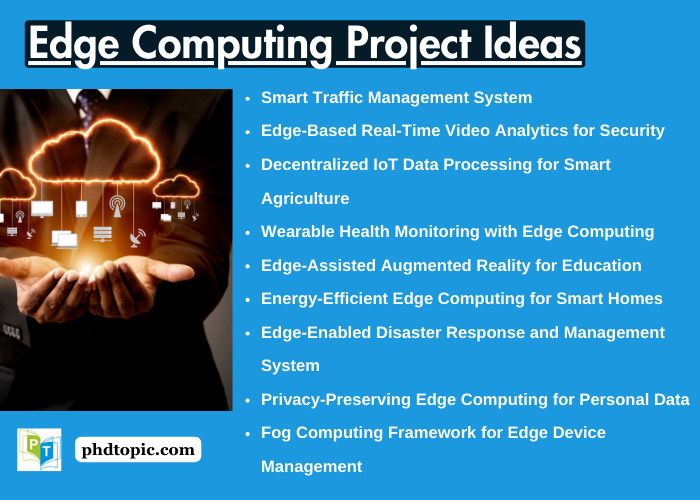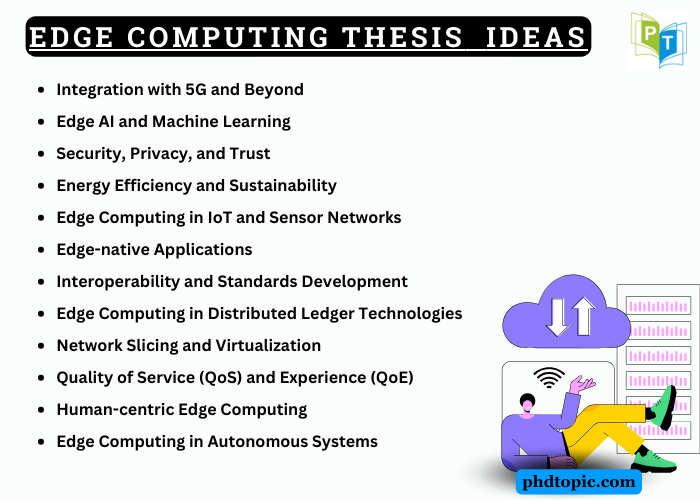In the field of edge computing, there are a wide range of project plans emerging and include different sophisticated technologies currently. Below, we suggest different Edge Computing Project Ideas and strategies that contain a vast amount of technical difficulties and applications:
- Edge-Based Real-Time Video Analytics for Security
- Aim: For safety necessities like detecting susceptible activity or illegal access identification, create a model which runs instant video recognition and confirms low latency with the assistance of edge devices.
- Procedure: By implementing deep learning frameworks for abnormality identification and entity finding, deploy edge computing nodes that are prepared with GPUs to process video streams from surveillance cameras.
- Smart Traffic Management System
- Aim: To enhance road safety, optimize traffic light control and decrease congestion, employ edge computing to observe practical traffic data from sensors and cameras.
- Procedure: In terms of recent traffic criteria, machine learning methods are used to refine traffic signals and process data at major connections locally by applying edge nodes.
- Decentralized IoT Data Processing for Smart Agriculture
- Aim: Permitting actual tracking and management of agriculture criteria without depending on cloud connections and designing a distributed model for executing IoT sensor data in digital farming applications.
- Procedure: To gather and observe data from crop health sensors, weather stations and soil moisture sensors, employ edge devices. Specifically for pest handling and irrigation control, include local decision-making abilities.
- Edge-Assisted Augmented Reality for Education
- Aim: For reducing the usage of latency and bandwidth, improve academic practices with augmented reality (AR) applications which process on mobile devices clearly using edge computing.
- Procedure: Especially for academics, develop an AR application like a previous simulation or virtual lab to assure perfect communicative practices in which large executing works are discharged to nearby edge servers.
- Energy-Efficient Edge Computing for Smart Homes
- Aim: By processing data from several digital home devices internally, enhancing energy consumption in smart homes, and to create wise options based on energy usage, edge computing is helpful.
- Procedure: For automating energy-saving options like handling the utility of appliances and improving thermostat environments, combine edge computing devices with digital home mechanisms to observe data from appliances and sensors practically.
- Wearable Health Monitoring with Edge Computing
- Aim: To track patient health indicators practically, apply a wearable device mechanism which employs edge computing and particularly in challenging scenarios, offer instant reviews or notifications.
- Procedure: Observe data on a nearby edge server or on-device by utilizing edge processing and build wearable devices which gather health data such as blood pressure and heart rate. Regarding the possible health problems, this notifies both the patients and healthcare suppliers.
- Mobile Edge Computing for Vehicle-to-Everything (V2X) Communication
- Aim: It is assisted by mobile edge computing architecture and through promoting real-world V2X interaction, enhances security and performance in transportation.
- Procedure: To distribute details about vehicle status, accidents and traffic criteria, construct a mechanism in which vehicles interact with roadside setups by edge computing nodes and with each other.
- Edge-Enabled Disaster Response and Management System
- Aim: In regions that are impacted by calamities, where standard interaction structures may be convinced, it is necessary to gather, execute and spread crucial details by developing a disaster response model which uses edge computing.
- Procedure: For examining instructions to help groups and impacted citizens and internal details to offer instant upgrades, collect data from disaster-influenced areas with the help of drones and mobile edge devices.
- Fog Computing Framework for Edge Device Management
- Aim: To shorten the arrangement, deployment and maintenance of application throughout a network of edge devices, design a fog computing model.
- Procedure: For tracking, resource scheduling and assisting deployment updates, create a management model which enables the centralized control of dispersed edge devices.
- Privacy-Preserving Edge Computing for Personal Data
- Aim: Minimizing the requirement to transfer vulnerable details through edge computing to run data processing in an interior way, and confirming confidentiality in applications which work on susceptible data.
- Procedure: To secure records but still allow suggested services, use encryption and privacy-protecting approaches and then apply a model which runs and observes private data on edge devices.
What is the future research in edge computing?
In recent years, edge computing has advanced as the latest technology due to the advent of IoT and the rapid evolution of devices that produce data at the edge of the network. We offer you a list of various fields that are available to describe the path of edge computing research in the future:
- Edge AI and Machine Learning
- Research Goal: Based on edge devices, designing weightless, effective AI and machine learning frameworks that are applicable for deployment. For protecting confidentiality and minimizing data sharing requirements, this involves the study of federated learning in which frameworks are instructed throughout many distributed devices.
- Integration with 5G and Beyond
- Research Goal: For applications like smart cities, captivating augmented and virtual reality practices, self-driving vehicles, discover how 5G networks and after can be utilized and improved by the edge computing to permit ultra-dependable.
- Security, Privacy, and Trust
- Research Goal: In edge computing structures, solving the native protection sensitivities and confidentiality issues. To protect edge devices and data, it includes developing privacy-protecting techniques, trust frameworks and powerful safety protocols.
- Energy Efficiency and Sustainability
- Research Goal: To reduce ecological influence, inventing energy-effective computing ideas and eco-friendly experiences for edge computing. For energy harvesting methods and edge devices, this involves sustainable energy sources.
- Edge Computing in IoT and Sensor Networks
- Research Goal: Using edge computing, improve the abilities of IoT devices and sensor networks. To assist practical decision-making in IoT applications, this includes enhancing analytics, storage and data processing at the edge.
- Edge-native Applications
- Research Goal: For utilizing the benefits of the localized data processing abilities and low-latency, modeling and constructing applications which are inherent to edge computing platforms. In farming, entertainment, production and healthcare, it contains several new applications.
- Interoperability and Standards Development
- Research Goal: Between different edge computing devices, services and environments, facilitating interoperability. To promote perfect collaboration and interaction throughout the edge computing setting, this topic has the advancement of regulations and protocols.
- Edge Computing in Distributed Ledger Technologies
- Research Goal: To permit safe and distributed applications, discovering the edge computing convergence with other separated ledger techniques and blockchain. Safe transactions, distributed handling and edge-oriented digital agreements are the aspects that are aimed in this study.
- Quality of Service (QoS) and Experience (QoE)
- Research Goal: Particularly for edge computing applications, designing approaches to assure and enhance the QoE and QoS. In application requests, user needs and network criteria, it contains adjustable methods which can answer to transformations.
- Edge Computing in Autonomous Systems
- Research Goal: Edge computing is used to improve the strength of automatic mechanisms like vehicles, robots and drones. It consists of immediate decision-making, ecological sensing and navigation that are assisted by edge processing.
- Human-centric Edge Computing
- Research Goal: It mainly aims at human-based edge computing applications like privacy-preserving computation for vulnerable data, supportive techniques and customized health tracking.
- Network Slicing and Virtualization
- Research Goal: To help the dynamic scheduling of materials in terms of the requirement of application, employing virtualization technologies and network slicing into the edge computing models. On arranging and handling virtualized networks at the edge, it contains an investigation strategy.
Edge Computing Project Topics
phdtopic.com research team is well-versed in edge computing and is ready to assist you at every step of the way. Likewise, our developers are knowledgeable about various smart techniques to improve all aspects in any edge computing project, resulting in better outcomes. Take a glance at some of the edge computing subjects for which we have offered tailored services to scholars.
- Multi-stage resource-aware congestion control algorithm in edge computing environment
- Multiobjective trajectory optimization with a cutting and padding encoding strategy for single-UAV-assisted mobile edge computing system
- Ultra Wide Band communication for condition-based monitoring, a bridge between edge and cloud computing
- Heterogeneous UAVs assisted mobile edge computing for energy consumption minimization of the edge side
- Computation power maximization for mobile edge computing enabled dense network
- A novel Q-learning-based hybrid algorithm for the optimal offloading and scheduling in mobile edge computing environments
- Multi task dynamic edge–end computing collaboration for urban Internet of Vehicles
- Three-way decisions based service migration strategy in mobile edge computing
- Contract-based scheme for computational resource allocation in cloud-assisted parked vehicular edge computing
- Hybrid path planning based on adaptive visibility graph initialization and edge computing for mobile robots
- A key-insulated secure multi-server authenticated key agreement protocol for edge computing-based VANETs
- A scheduling algorithm for heterogeneous computing systems by edge cover queue
- Development and application of subsoiling monitoring system based on edge computing using IoT architecture
- Users’ experience matter: Delay sensitivity-aware computation offloading in mobile edge computing
- Portable electronic nose system with elastic architecture and fault tolerance based on edge computing, ensemble learning, and sensor swarm
- Online Task Scheduling Algorithm with Complex Dependencies in Edge Computing
- A configuration method of computing resources for microservice-based edge computing apparatus in smart distribution transformer area
- Bandwidth-efficient multi-task AI inference with dynamic task importance for the Internet of Things in edge computing
- Enhancing the robustness of object detection via 6G vehicular edge computing
- GP-NFSP: Decentralized task offloading for mobile edge computing with independent reinforcement learning


